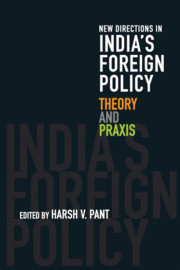Book contents
- Frontmatter
- Contents
- Preface
- 1 Introduction
- Part I Theoretical Evolution
- Part II Emerging Themes
- 7 Non-Alignment and Beyond
- 8 India and Multilateralism: Concepts, New Trajectories and Theorizing
- 9 India and the Responsibility to Protect
- 10 India and the Indo-Pacific Discourse
- 11 India and Nuclear Deterrence
- 12 India and Its Diaspora
- Bibliography
- Contributors
- Index
10 - India and the Indo-Pacific Discourse
from Part II - Emerging Themes
Published online by Cambridge University Press: 13 November 2018
- Frontmatter
- Contents
- Preface
- 1 Introduction
- Part I Theoretical Evolution
- Part II Emerging Themes
- 7 Non-Alignment and Beyond
- 8 India and Multilateralism: Concepts, New Trajectories and Theorizing
- 9 India and the Responsibility to Protect
- 10 India and the Indo-Pacific Discourse
- 11 India and Nuclear Deterrence
- 12 India and Its Diaspora
- Bibliography
- Contributors
- Index
Summary
In November 2017 Foreign Secretary Subrahmanyam Jaishankar noted ‘the growing appreciation and acceptance of the concept of Indo-Pacific’. Followers of Indian foreign policy would not have encountered the term Indo-Pacific before 2006, but a decade later it has become a ‘new template of analysis’ for Indian security and foreign policy analysis. Media use has also become common. Indeed Indian figures talk of ‘the Indo-Pacific imperative’ for India. The Indian ambassador to Singapore emphasized ‘our vision of the Indo-Pacific region as our natural habitat […] and our strategic commitment to the region’. His choice of words around the term ‘Indo-Pacific’ were revealing – our vision, of a region that was India's natural habitat.
In a broad generalized sense, the term ‘Indo-Pacific’ involves both Indian and Pacific Oceans (for India especially the eastern Indian Ocean and western Pacific), with the South China Sea as a joining buckle. The ‘Indo’ bit of the term ‘Indo-Pacific’ points not only to the Indian Ocean but also to India. Whereas India is marginal to the term Asia-Pacific (that is, the Pacific basin and the Pacific Rim), it is self-evidently politically and geographically right in the Indo-Pacific.
Geopolitically the adoption of the term ‘Indo-Pacific’ reflects a shift of focus by India from land (the Indian subcontinent) to maritime concerns. It reflects further development in India's own foreign policy formulations. First was the formulation since the 1990s that India's strategic horizons were no longer restricted to its immediate neighbourhood of South Asia, but instead also involved what was styled as India's extended neighbourhood. This was also described as an omni-directional diplomacy, which consisted of a Look West to the Middle East, a Look North to Central Asia, a Look South to the Indian Ocean and a Look East to Pacific Asia. India's Indo-Pacific pivot in effect represents a fusion of its Look South and Look East horizons established and gradually widened since the 2000s. India's self-defined strategic interests are Indo-Pacific wide, stretching from established interests in the Indian Ocean, to growing interests in the South China Sea, and indeed into the South/West Pacific. The election of a new BJP-led administration headed by Narendra Modi brought a new eastwards emphasis encapsulated with the mantra Act East.
- Type
- Chapter
- Information
- New Directions in India's Foreign PolicyTheory and Praxis, pp. 195 - 214Publisher: Cambridge University PressPrint publication year: 2019



